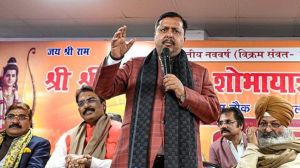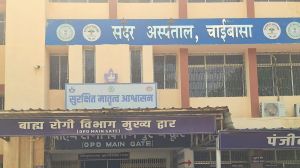How the BJP lost the plot
After being on a high with a string of state assembly election, the Bharatiya Janata Party hit a roadblock when it lost eight of its MPs and 13 MPs from the NDA alliance to the UPA during the July 22 trust vote.

After being on a high with a string of state assembly election, the Bharatiya Janata Party hit a roadblock when it lost eight of its MPs and 13 MPs from the NDA alliance to the UPA during the July 22 trust vote. For a party built on cadres and discipline, this came as a shock. BJP leader L K Advani said the party was outraged by this act of open defiance.
It was, however, an ideological drift, along with some shoddy political management, that did the party in. The party also ended up facilitating the rise of a third front under the leadership of BSP supremo Mayawati, when it was the time8212;as a leader said8212;8220;to aggregate and consolidate8221;. When the BJP initially appeared half-hearted in its opposition to the UPA Government on the Indo-US nuclear deal, Mayawati lost no time to emerge as the real opposition. When the BJP struggled to re-occupy the opposition space at the crunch hour, it floundered.
If only the party had a Pramod Mahajan in its midst, things would have been infinitely better. When the BJP and allies meet for the next NDA meeting on July 28, it would have to get back to the drawing board.
The ideological drift
The Indo-US nuclear deal exposed chinks in the BJP8217;s ideological armour. Many in the BJP treat the US as India8217;s natural ally and the nuclear deal as 8220;a logical culmination of the foreign policy initiatives initiated during Atal Bihari Vajpaaye8217;s prime ministership8221;. There8217;s been, therefore, a great deal of confusion over the tone and tenor of the party8217;s opposition to the deal.
It was the Yashwant Sinha-Arun Shourie duo who firmed up the party8217;s position on the deal initially. After former President A P J Abdul Kalam openly spoke in favour of the deal, its party president Rajnath Singh who is believed to have told a select group of leaders that the party should nuance its opposition to the deal 8220;Few can claim to be bigger patriots than Kalam,8221; he is believed to have said.
Advani didn8217;t reject the idea outright but said the country should never forego its right to conduct future nuclear tests. This position coincided with the RSS pratinidhi sabha resolution that said the country8217;s nuclear sovereignty must never be compromised. In a BJP core group meeting a couple of months ago, Venkaiah Naidu, Arun Jaitley and V K Malhotra veered towards the reformist position while Sushma Swaraj warned against any dilution in the party8217;s opposition to the deal.
Things changed after the UPA Government went to the IAEA with the nuclear safeguards agreement. Prompted by Shourie, Advani said that 8220;India was being treated as a non-nuclear weapon state and Dr Manmohan Singh meekly acquiesced to this position8221;. Reiterating that the party was wedded to its nuclear nationalism plank, Advani said that the BJP, if voted to power, would renegotiate the deal with the USA, 8220;where the two countries would be treated as equals8221;.
The BJP8217;s allies like the Shiv Sena and the Shiromani Akali Dal said that they were not against the deal per se, but would vote against the UPA Government on the basis of the its four years of rule. In the NDA meeting, Advani, too, said that the nuclear deal would be referred to only tangentially and the government8217;s four years of balance-sheet, including inflation, terror attacks and the Amarnath Yatra would come under close scrutiny in the trust vote debate.
Shaky floor coordination
With its Rajya Sabha brigade acting as the bridge between the BJP and the Left, the saffron party broke bread with its ideological opposite in the run-up to the trust vote. Its floor management with NDA partners, however, left much to be desired. It was reminiscent of the hash of a campaign for its Presidential candidate Bhairon Singh Shekhawat.
While the BJP had a tough time in making allies like the Shiromani Akali Dal and Shiv Sena fall in line, the massive cross-voting from its ranks came as a bolt from the blue for the party. With as many as 13 8220;whips8221; and 10 chief ministers of the NDA-ruled states to take care of its 130-odd MPs, the party was shocked by as many as eight MPs switching camps, helping the UPA sail through on D-Day. The BJP was at a loss to explain the large-scale desertion in its ranks.
It was said that two renegade Karnataka MPs, Manjunath Kunnur and Manorama Madhwaraj, had a Congress background. Karnataka BJP president Sadanand Gowda claimed the third MP, H T Sangliana, turned a turncoat due to 8220;communal politics.8221;
Two other BJP MPs, Somabhai Patel and Babubhai Katara, were already under suspension while UP BJP MP and history-sheeter Brijbhushan Sharan Singh had local electoral compulsions. Karnakata8217;s D C Srikantappa is said to be suffering from lung cancer and so could not attend. Madhya Pradesh8217;s Chandrabhan Singh was won over by the Samajwadi Party. Harisingh Nasrau Rathod8212;considered close to party general secretary Gopinath Munde8212;was the real surprise in the pack though.
BJP leaders like V K Malhotra came up with theories of 8220;the Congress alliance having spent as much as Rs 500 crore to win the trust vote.8221; Shiv Sena leader Sanjay Raut, however, said that the NDA suffered from 8220;overconfidence8221;. Another NDA leader added that the alliance didn8217;t display the same political management skills and resolve that the Congress did. 8220;Only a handful of MPs can be tempted by the lure of the lucre. This large-scale dissension showed a bigger problem that included delimitation-related issues as also individual party issues,8221; he said.
Last minute botch-up
Three BJP MPs, all from weaker sections8212; Ashok Argal, Mahavir Bhagora and Fagan Singh Kulaste8212;were reportedly offered 8220;Rs 3 crore each by the Samajwadi Party-Congress combine to abstain from the trust vote8221;. While the MPs, with the support of news channel CNN-IBN, managed to capture part of the action on tapes, it was not aired by the channel, which said that the investigations had not been completed.
When TV grabs of the trio waving wads of currency notes in Parliament shocked the country, they narrated the bit-by-bit account of the sting operation at the all-party meeting convened by the Speaker. The BJP demanded that the Speaker view the sting operation tape before going for the trust vote but were reportedly told that the request had to be given in writing and that the matter would be referred to a House Committee, like it was done in the case of Operation Chakravyuh when MPs were offered money for asking questions in the House.
A section of the BJP, led by Rajnath Singh, argued that the party should have stalled the House proceedings and walked out over the issue. Advani and others, including Malhotra, involved in floor coordination, had a different experience though.
When the BJP managers informally contacted the Left and the BSP, they were sympathetic to the cause, but there was no way that they could have walked out over the issue. 8220;Rumours like four BSP MPs being won over were doing the rounds since the morning on July 22. The Left, the BSP, and even leaders like Deve Gowda said that the people must know who were betraying their cause, and hence a division of votes was imperative,8221; said CPIM MP and one of the party8217;s speakers on the issue, Mohammad Saleem. The BJP thought it prudent not to walk out of the House as such a step could invite the charge of helping the UPA government win a walkover. The BJP then lambasted the UPA for its 8220;taint-slurred win in the trust vote8221;.
The BJP plans to launch an all-India stir from Sunday on the issue. More than a stir, the party would do well to do some honest introspection to win the minds and the hearts of its core constituency of middle class. The July 22 trust vote was an opportunity gone horribly wrong for the party.
- 01
- 02
- 03
- 04
- 05































